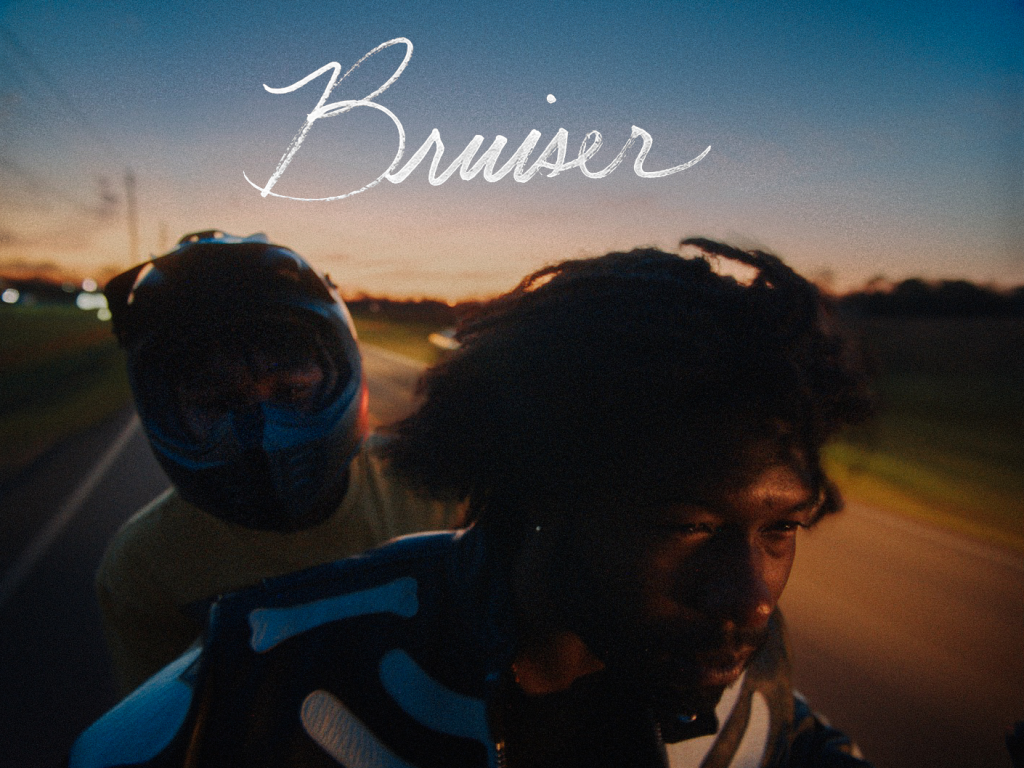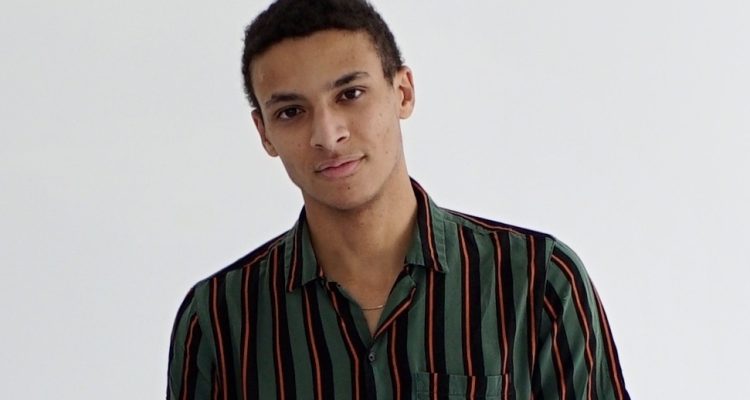In his piercing feature debut, director and writer Miles Warren asserts himself as a talent on the rise with his resonant and introspective feature, Bruiser, which premiered at the Toronto International Film Festival in September.
The feature is based on Warren’s short film of the same name and was nominated for the Grand Jury prizes at Sundance Film Festival and SXSW 2021. Together with co-writer Ben Medina, Warren expanded on his coming-of-age story of influential masculinity in the pivotal time of a young teenage boy’s life, when he starts to push parental boundaries while searching for connection.
Bruiser follows 14-year-old Darious (Jalyn Hall), a scholarship student home for the Summer who’s struggling to connect with his emotionally distant father Malcolm (Shamier Anderson) when he meets Porter (Moonlight’s Trevante Rhodes), a charismatic drifter who lives on a houseboat in the woods. When Darious learns Porter’s true identity, he is caught in the middle between the two men as his family quietly rips apart.
The progression from short film concept to feature film allowed Warren to explore ways to build on his initial vision for the story, which he began writing with Medina in 2016. Climactic moments from the short are transposed into wide-ranging and affecting set pieces that use similar camera techniques but are reimagined to elevate the tension and underscore the fragile bonds between the characters. Bruiser is a convincing argument for short film concepts and new talent.
“I was one of those lucky people that had a script that was almost ready to go [after Sundance],” explains Warren. “Right after those festivals, I was pitching to people and having them read the script… convincing them that even though I was young, I could make a movie. Then it just worked out, and it was a really incredible turnaround where it’s less than a year from the short film premiering to shooting the feature [of Bruiser].”
Just hours before the US premiere of Bruiser at AFI fest, Warren spoke with Awards Focus about attaching Trevante Rhodes to the film, repurposing an intense scene with a heavy barbell, and addresses the ambiguity of Porter’s interactions with Darious.
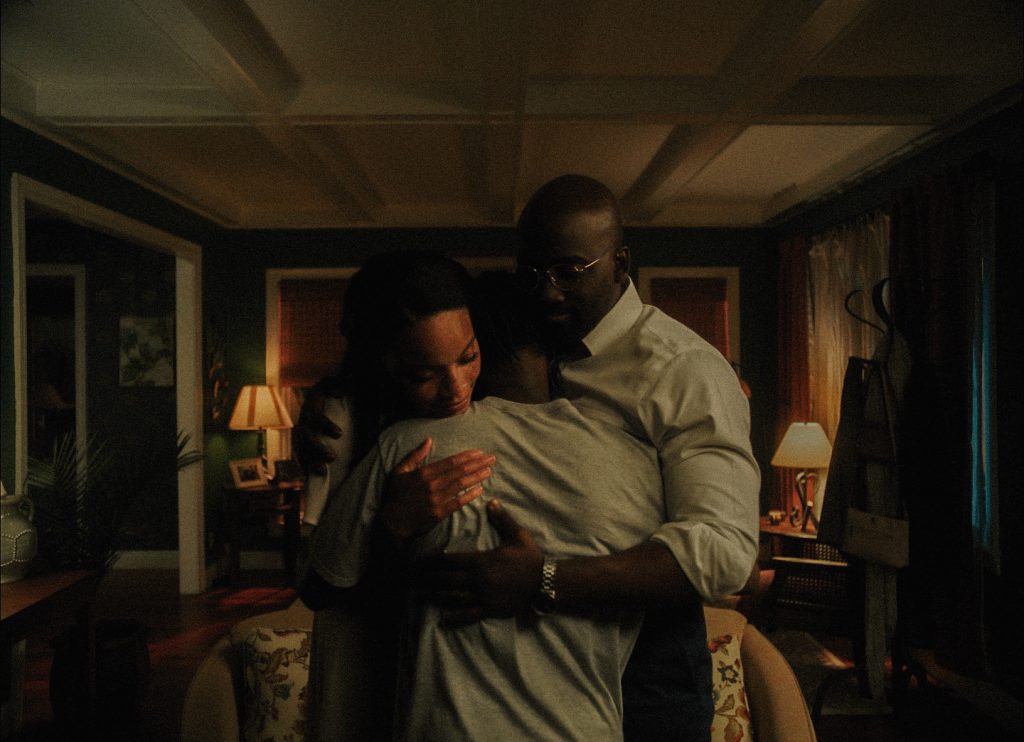
Awards Focus: Bruiser is screening at the AFI Festival tonight. What’s going through your mind right now?
Miles Warren: We’ve only had two public screenings of this movie, so I’m really excited for another audience to see it. Bruiser played twice at the Toronto Film Festival, and it was an incredible experience. There’s been a month gap now, and I’ve been itching to get more people to see it.
AF: The short film on which the feature is based played at numerous festivals, including Sundance and SXSW. What was the process of developing the feature after the festival run?
Warren: I started writing a feature version of Bruiser first in 2016 with a friend of mine, Ben Medina when we were in college. I had been working on this script for a long time, and the short film became a proof of concept when I came out of college. We distilled the themes and ideas and some of the images into a 12-minute short film, and that’s what played at the festivals.
The thing about Sundance with short films is that everyone’s like, “Oh, the short was really good. So what are your plans?” I was one of those lucky people that had a script that was almost ready to go. So right after those festivals, I was pitching to people and having them read the script and chatting about it, convincing them that even though I was young, I could make a movie. Then it just worked out, and it was a really incredible turnaround where it’s like less than a year from the short film premiering and shooting the feature.
AF: Trevante Rhodes is a producer on the film. Was it through the festival routes that he became involved?
Warren: After going through the festivals, I got a manager, and they were able to get to him personally. Tre was one of the first meetings I had for this movie with an actor and was literally the first person on our list to play Porter. Right away, it was an incredible meeting. We talked for only like thirty minutes, and he told me he would play whichever role and do whatever we needed. It gave me a lot of confidence to hear that.
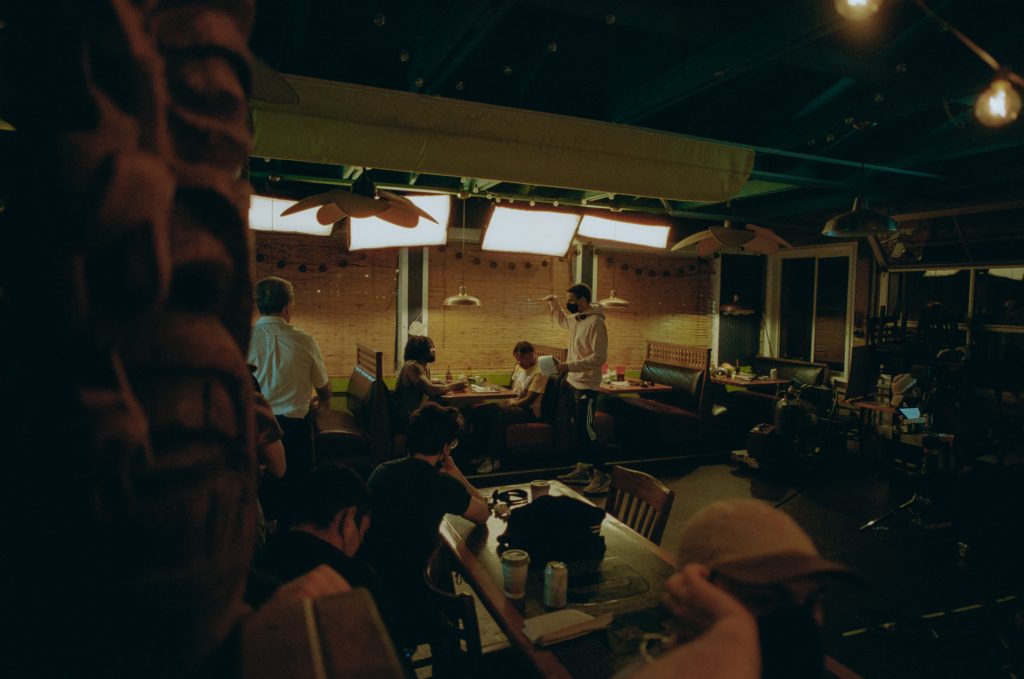
AF: Touching on what you mentioned before about taking key imagery from the feature version to infuse in the short film proof of concept, did you know how you wanted to evolve those images, like the barbell scene or fight between the fathers in the feature?
Warren: The idea in the feature version for the barbell scene came from a viral video I saw when I was 11 that I think is super fascinating. It’s literally just a kid getting stuck under a barbell, and it’s scary and intense, and it always stuck with me after I watched it. We put it into the feature film, and it was always in the script when we were writing it. With the short, we took that scene and put it towards the end and made a climactic moment. So it was repurposing something that’s more of a character development harrowing moment in the middle of the feature film.
It’s one of my favorite little moments because it’s so innocuous, and it starts with Darious walking around just bored and then becomes this intense sequence where we don’t cut. We stay there. I also think because we shot the short film first that we learned so much from that experience. I was able to improve the scene a little bit more and find ways to make it a little bit more intense.
AF: Another sequence from the short film that’s expanded on in the feature is the fight scene between the two men, which also has a tracking shot of the men as they brawl. But the combination of the street lighting and remoteness of the location added to the intensity of the moment in the feature. How did that sequence come about, and was it a difficult shot to prepare?
Warren: The ending of Bruiser the feature was one of the first things I invented with these two gargantuan figures going at it and letting out all their anger at each other. The idea to do it on the side of the road just felt like an epic climactic setting.
My co-writer Ben [Medina] and I wrote the scene a bunch of different ways, and ultimately, later on in the process, we came up with the idea of going in and out of darkness, rooting us more in Darious’s perspective. This whole movie, you’re in Darious’s journey and his point of view, so having the fathers come in and out of that darkness was really exciting to us and felt really dynamic and intense.
That tracking shot was how I wanted to shoot the movie. I wanted to shoot in a lot of formalist frames and not do the classic fighting sequence where you’re coming in and out and trying to get all these interesting angles.
Fighting is really funny and intense when you just watch it and have to see the awkward movements. So that tracking shot seemed like the most dynamic way to track these guys in and out of the light from the lamp post on the side of the road. The two fathers are committing to needing to destroy each other and leaving this child behind. I absolutely love that image.
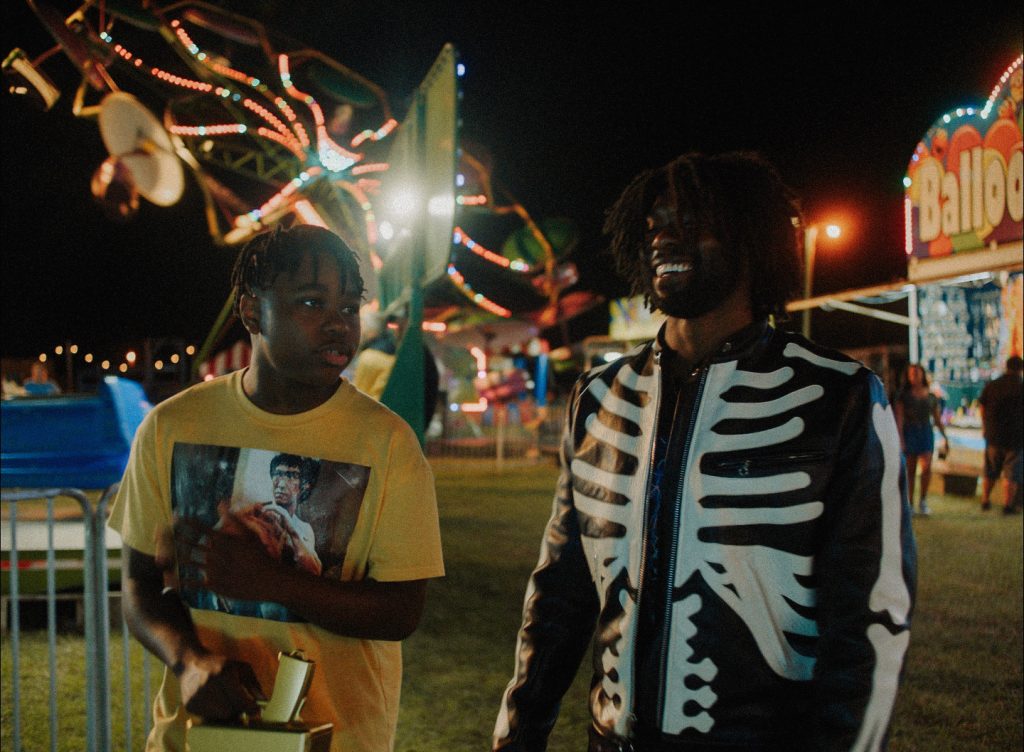
AF: There’s also a strong visual representation of the connection between Darious with Porter through their hair. What was the intention behind how their hair was styled in the film, and how did you come up with the looks of the main three male characters?
Warren: Malcolm was always supposed to be bald because we thought it’d be funny for him. We were trying to create someone who is very specific in the way he looks and the way his routine is. It was like he was going bald and shaved it all off because, for someone like him, it’s about controlling everything.
Porter has these iconic rapper dreads that you see in culture right now. You know he’s gone and lived a life, and he knows rappers. He’s been in Vegas, and his hair represented years and years of doing these mysterious Porter things. So the two fathers had very contrasting looks.
Jalyn, who is this incredible actor, seemed a little older than Darious was written but in a way that he’s still 14 but with bigger muscles and still has that childlike mentality.
There was something really exciting about putting a kid like that in smaller dreads. It would help with this connection with Porter and the disconnect with his own family. Then I started adding in these lines like “oh my god, your hair is so different” and “I love these rapper dreads.”
Black hair is a very specific thing where you can either be very creative or just shave it off. It’s a very interesting signifier for a black person. So that slowly became something we worked into the script to bond Darious and Porter.
AF: When Malcolm loses his temper at the carnival after finding Porter and Darious talking together, it felt like the visual of seeing his son with Porter, and their similar hair amplified his reaction.
Warren: I’m glad you picked up on that. It was something I was really excited about.
AF: That scene also balanced the threat of Porter that Darious’s parents were concerned about and Porter’s legitimate intention to get to know his son. How did you and Ben approach that balance while writing Porter’s character?
Warren: That’s a great question, and writing that scene over the course of five years was probably the most fun because it fell right in the middle of the movie.
It felt like so much of the movie was that dialogue scene, and we didn’t care how long it would be. We would’ve made it the whole movie.
We started to build the scene in the way Porter would talk about Malcolm to Darious and how he characterized that friendship with Malcolm. Porter’s tiptoeing around like Malcolm is his little brother. It’s a kind of posturing but very subtle. Porter’s also asking about Darious’s girlfriend and listening and trying his best to be there while also talking about his tattoo.
That’s what excites me. It’s character work. When you have a kid who’s looking for someone and a guy who is giving all of that and more to the point where you’re not sure if what he’s saying is fact or fiction and just trying to get on this kid’s good side. It was a long process, and I think it came together beautifully in this scene, and we shot it very simply. No tricks. It’s just them hanging out, and I think it ends up being a really nice bonding moment.
Bruiser was acquired by Hulu with a release date to be announced.
